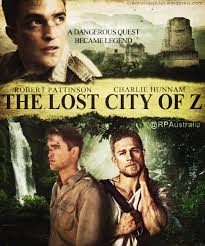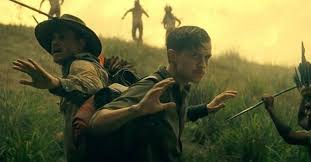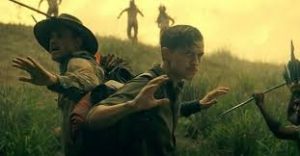The Lost City of Z
Posted on April 20, 2017 at 5:34 pm
B +| Lowest Recommended Age: | Middle School |
| MPAA Rating: | Rated PG-13 for violence, disturbing images, brief strong language and some nudity |
| Profanity: | Brief strong language |
| Alcohol/ Drugs: | Alcohol, smoking |
| Violence/ Scariness: | Peril and violence including WWI battles and attacks by indigenous people |
| Diversity Issues: | Class, race, and culture issues a theme of the movie |
| Date Released to Theaters: | April 21, 2017 |
| Date Released to DVD: | July 10, 2017 |

From the early 19th to the early 20th century, the British Empire exemplified a spirit of adventure, devotion to duty, and confidence bordering on hubris that led to extraordinary achievements like the Oxford English Dictionary and the arrogant imposition of colonialism around the world. All of that is in this true story of Percy Fawcett, an officer in the British Army whose eight trips to South America in search of ancient ruins inspired characters in books by H. Rider Haggard and Arthur Conan-Doyle (The Lost World) (both friends of Fawcett’s) and in movies like “Raiders of the Lost Ark.” Basically, if the hero wears khakis as he slashes through the jungle, he owes something to Percy Fawcett.
Writer/director James Gray based the screenplay on the book by David Gann and the letters of Fawcett and his wife, and shaped the story to make it more accessible, turning eight trips into three and reflecting a more contemporary understanding of race and gender. That is notable in Nina Fawcett’s attempt to insist that she should accompany her husband on an expedition and in the treatment of the natives, who are portrayed with dignity and agency, and treated as such by Fawcett.
He also helps us understand the pressures of the era that helped to motivate Fawcett’s journeys. The unlimited opportunities of the uncharted jungle were especially compelling. In addition to giving him the chance to earn money for his family, a major discovery would allow him to return to England in triumph and overcome the disgrace his father had brought to the family name. We first see him outracing his fellow officers, showing us his skill and determination. When he has the opportunity to go to Bolivia to map the country’s boundaries — to protect the British business interests in South America — he does not want to leave his family but he is eager to escape the restrictions of Edwardian social class. “He’s rather unfortunate in his choice of ancestors,” one character sneers.
On the mapping expedition he hears about a place where there are artifacts of a prehistoric civilization and he is determined to find it and come home in triumph. He teams up with the loyal and capable Henry Costin (Robert Pattinson, unrecognizable behind a thick beard).
On his second visit, he brings along a veteran explorer, James Murray (Angus Macfadyen), who had been with Shackleton on his expedition to Antarctica, which turns out to be a very bad decision. But it is also the final proof for Fawcett that class and reputation are not determinative. On the third trip, after Fawcett’s return to military service in WWI, he brings his once-estranged son (Spider-Man Tom Holland) and reaches a new understanding and reconciliation.
Gray ably conveys the curiosity and wonder of the journeys and the passions that impel the adventurers. Pattinson’s performance is especially thoughtful and Hunnam does well, especially in an impassioned speech to the skeptics at the Royal Geographical Society and in showing us how his journeys change his views of himself and his world, perhaps inspiring us to imagine our own.
Parents should know that this film includes extended peril and violence including wartime battle scenes, sad deaths, some graphic and disturbing images, native nudity, brief strong language.
Family discussion: Why did Percy keep returning to his search? What did he learn from his experience with Murray?
If you like this, try: “The Man Who Would be King,” “The Lost World,” “Mountains of the Moon,” and the books by H. Rider Haggard and Arthur Conan-Doyle inspired by Fawcett’s adventures


